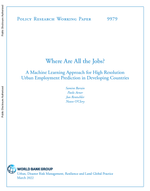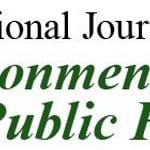What do we really know about climate, migration and cities?
A simple search on Google using the terms ‘climate’ and ‘migration’ shows the rapid growth in the number of times people have used them as search terms over the last decade.

The Informal Cities Programme ran from 2019 - 2023. The following page is an archived resource.

By 2050 nearly 70% of the world's population will be urban, and delivery of the UN’s Sustainable Development Goals will increasingly be in the context of city environments. However, as formalised cities grow in the developing world, so do informal, self-constructed settlements and their economies.
These operate outside the common legal and regulatory framework and yet are intricately woven into the functioning of the city. This informal sector covers the entire social and economic framework of places like Brazil’s favelas or South Africa’s townships. Globally, the informal sector is estimated to represent over 60 percent of cities, with the vast majority of jobs in many of the world’s emerging economies considered to be informal.
Understanding informal cities, and the millions of lives lived within them, is fundamental to meeting the SDGs. Yet the diverse and dynamic nature of informal cities creates a huge challenge for large-scale data collection and analysis.
More recently, several innovative solutions for efficient and scalable collection of environmental, behavioural and other data have been reported, but to extract meaningful information from them requires collaboration across several scientific disciplines, with the active engagement of non-academic stakeholders.
We will select a sample of diverse cities (one from India, one from Africa and one from Latin America) and will investigate the types of data available, their timeliness, comprehensiveness and depth for each city. With a focus on informal systems, we will collect and harmonize existing data sources, including administrative data, regional surveys, geospatial data, satellite imagery and mobile data. We will draw on expertise in anthropology, geography, mathematics and epidemiology to find new ways to study informal neighbourhoods, economies, healthcare and transport in cities.
We will collect data relating to several SDGs - including but not limited to health, gender equality, economic growth, infrastructure and inequality - and harmonise them to enable comprehensive study of the interconnections between various forms of provision in the informal city: housing, employment, transport and healthcare. With the ‘data gap’ on informal cities bridged, we will search for both scalable and specific solutions to delivery of SDGs in informal city systems.

This project maps the spatial urban economic dynamics of 14 cities across the global south.
Visit project pageThis project investigates how climate-related migrants secure access to urban infrastructures and services, and how they negotiate living alongside existing residents.
Visit project pageThis projects combines traditional survey data with satellite derived atmospheric data to shed light on,and seek solutions to, the environmental burdens facing the world's poorest people.
Visit project pageThis projects uses novel analytical approaches to support decision makers to be able to make informed changes to policy to help many of the world's poorest people.
Visit project pageA simple search on Google using the terms ‘climate’ and ‘migration’ shows the rapid growth in the number of times people have used them as search terms over the last decade.
To understand the impacts of the pandemic on different groups it is important to engage with the experience at the margins of society and to examine the socially and long-lasting effects of the virus.

An interpretable machine learning framework for measuring urban perceptions from panoramic street view images (SVIs)

Climate mobilities into cities: A systematic review of literature from 2011 to 2020

Uncertainty-Aware Interpretable Deep Learning for Slum Mapping and Monitoring

Investigating the association of environmental exposures and all-cause mortality in the UK Biobank using sparse principal component analysis

Where Are All the Jobs? A Machine Learning Approach for High Resolution Urban Employment Prediction in Developing Countries

Ambient Air Pollution and Respiratory Health in Sub-Saharan African Children: A Cross-Sectional Analysis
If you found this page useful, sign up to our monthly digest of the latest news and events
Subscribe